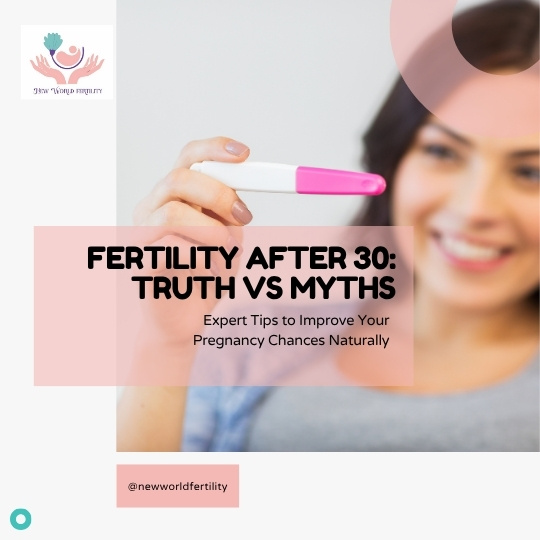Introduction:
Turning 30 often brings a mix of personal and professional milestones — and for many, it’s also when the journey toward parenthood begins. While the biological clock does tick, it’s not a buzzer. However, it's important to understand how fertility after 30 shifts and what steps can increase your chances of a healthy pregnancy.
Common Myths About Fertility After 30 – Busted!
Myth 1: You can’t get pregnant after 30
✅ Fact: Many women conceive naturally in their early and even mid-30s. Fertility gradually declines, but 30 is not the cutoff.
Myth 2: IVF is the only option after 30
✅ Fact: While assisted methods help, many women over 30 conceive naturally with good health and timing.
Myth 3: Men’s age doesn’t affect fertility
✅ Fact: Male fertility also declines with age — affecting sperm quality, motility, and DNA integrity.
Fertility Facts You Should Know:
-
Female fertility starts to decline gradually at 30, with a sharper drop after 35.
-
Egg quality and quantity both reduce with age, increasing the risk of chromosomal abnormalities.
-
The risk of miscarriage and complications increases slightly after 35.
-
Lifestyle factors like smoking, stress, alcohol, and poor nutrition can accelerate fertility decline.
Smart Steps to Boost Fertility After 30
1. Track Your Ovulation Accurately
Use ovulation kits, apps, or basal body temperature tracking to time intercourse during your fertile window.
2. Adopt a Fertility-Friendly Diet
Eat more leafy greens, whole grains, seeds, and antioxidant-rich foods. Include folic acid, iron, and omega-3s.
3. Maintain a Healthy Weight
Being underweight or overweight can disrupt hormone balance and ovulation.
4. Get a Fertility Evaluation Early
Don’t wait too long. Basic tests like AMH, AFC, or semen analysis can give you a clearer picture.
5. Minimize Stress and Sleep Well
Chronic stress and lack of sleep can impact hormone regulation. Practice mindfulness, yoga, or take breaks when needed.
6. Limit Alcohol, Smoking, and Caffeine
Reduce or eliminate these to improve egg and sperm quality.
7. Consider Supplements
Take prenatal vitamins, vitamin D, and CoQ10 after consulting with a fertility expert.
When to Seek Help?
You should see a fertility specialist if you are:
-
Trying for over 12 months (under 35 years)
-
Trying for over 6 months (35 years and above)
-
Experiencing irregular periods, PCOS, thyroid, or endometriosis
-
Have had multiple miscarriages
FAQs
Q1. Is it harder to conceive after 30?
Fertility does decline slightly, but many women still conceive naturally. With healthy habits and awareness, your chances remain strong.
Q2. Should I freeze my eggs at 30?
If you're not planning pregnancy soon, egg freezing can be a smart option — especially before 35 for better quality eggs.
Q3. Can lifestyle changes reverse fertility decline?
While aging can't be reversed, lifestyle changes can optimize egg quality and hormonal balance, increasing your chances of pregnancy.
Q4. How do I improve fertility after 30 naturally?
Track ovulation, eat healthy, exercise moderately, take supplements, avoid smoking/alcohol, and reduce stress.
Conclusion:
Fertility after 30 may come with challenges, but it’s far from impossible. By understanding your body, avoiding myths, and taking proactive steps, you can enhance your chances of conceiving naturally or with support from modern fertility science.
Ready to take charge of your fertility journey?
Connect with the experts at New World Fertility today for personalized guidance, modern fertility testing, and compassionate care.

 Nov-12-2025
Nov-12-2025